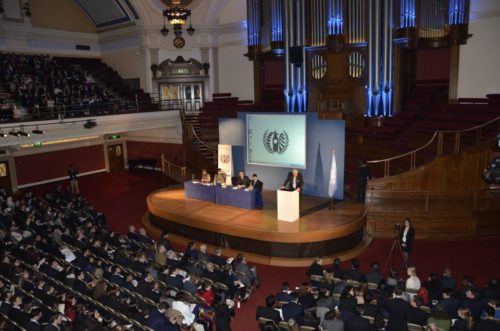
King’s College London delegates at WorldMUN. Photo credit: King’s College London United Nations Association
Kevin Felix Chan (KFC): First, let’s define the British university MUN circuit. Many delegates have heard of or been to LIMUN and OxIMUN as they are two of the most established conferences in the UK. Would those be considered the two cornerstones of the circuit? What are some other conferences that would be considered major conferences on the circuit?

Sam Povey
Sam Povey (SP): LIMUN and OxIMUN are certainly the cornerstones as far as international delegates (from outside the UK) are concerned, simply because they are the most international! However, for MUNers in the UK, the addition of Cambridge University International MUN (CUIMUN, “coy-MUN”) and ScotMUN make up the four “major” conferences of the year. Beyond that, there is a universe of small and medium-sized conferences throughout the year!

George Mullens
George Mullens (GM): LIMUN and OxIMUN are generally considered to be the most established conferences in the UK. However, CUIMUN is actually the oldest conference in the UK, older than LIMUN and OxIMUN. Conferences like ScotMUN, NottsMUN, LSEMUN and CardiffMUN have been running for a few years and regularly attract from 150-300 delegates per year.
KFC: LIMUN is the largest conference in the UK, but OxIMUN has a reputation for being more competitive. To what extent are those two conferences representative of a typical MUN conference in the UK?

Delegates dining at Oxford during OxIMUN
SP: OxIMUN is more representative of a “typical” British MUN conference. This is mainly due to the fact that the committees are much smaller, generally 50 delegates or less. This dramatically alters the dynamics of the committee sessions, with much more back-and-forth in debate compared to larger, LIMUN committees where speaking time is divided between more delegates. As a result, the quality of debate is naturally higher, as it allows delegates to rebut rather than use their speaking time to push their own agenda.
GM: Neither LIMUN or OxIMUN are a proper representation of the typical MUN conference in the UK. Most of the conferences in the UK tend to be much smaller by North American standards and no where near as competitive as these two conferences. Instead, most conferences in the UK are organised by smaller Model UN Societies with a few dedicated society members and typically attract 100-300 delegates maximum rather than the 1500+ delegates which LIMUN has.
KFC: Compared to the US, MUN conferences in the UK seem to have strengths in terms of international delegate diversity and classier social events. Could you elaborate more on these aspects?

Delegates Ball during LIMUN
SP: “British” delegates are certainly a diverse bunch! Delegate diversity in the UK reflects our student population. Almost 20% of students in the UK are “international”, compared to about 5% in the US. I don’t know what I’d say about “classier” social events, but there is a lot of emphasis on socials at UK conferences. Most British conferences run from Friday until Sunday, with time for a Friday and Saturday social. Many conferences put on a formal, black-tie dinner (to varying degrees of success), the most well-known being the OxIMUN and CUIMUN dinners, where “college” formal dinners are a traditional part of university life. Almost every conference will host at least one club night, with appropriately severe hangovers the following morning. Although, this is probably easier to pull off in the UK with a drinking age of 18!
GM: Due to its proximity to the continent, many delegations from the continent attend conferences in the UK. The very international composition of British universities tends to result in having more international delegations. Social events in the UK tend to be one of the major attracting point for delegations. This is most likely seen as an incentive for attracting new delegates to conferences. By saying that you’re going to a social event that also has a college dinner in one of the prestigious colleges of Cambridge or Oxford is a very large recruitment factor. Similarly, the lower drinking age in the UK definitely brings a larger focus on social events, however that doesn’t necessarily mean that all social events are classy!
KFC: In the UK and in Europe as a whole, there’s a culture of MUN veterans being invited to Chair at multiple conferences, and some participants no longer serve as delegates and basically attend the “chairing circuit.” This culture does not exist in the US as participants only Chair when their own university is hosting a conference. What do you think are some positives and negatives of this chairing culture?
SP: The chairing circuit is seen as the natural progression of a MUN career in the UK. Overall, I would say that it is a good thing. It creates a class of “professional” chairs who gradually gain more experience and can, generally, be relied upon to act competently. This is especially important for the crisis circuit, where it is essential to be able to recruit experienced staff. This works well in the UK because the MUN circuit is so tightly-knit; word travels fast and everyone has mutual friends, so it is easy for a secretariat to root out chairs who are not up to the job. On the downside, the chair circuit can be extremely cliquey, which can help people who are well-connected but not necessarily competent find chairing positions.

George Mullens received the Oxbridge Chairing Award in 2016
GM: As someone who hasn’t been a delegate in two years and essentially just attends the “chairing circuit”, I’d say that it’s extremely positive. Competition for chairing positions is often very high and ensures that the best chairs on the circuit promote good practices. Therefore, the standard of chairing at conferences like LIMUN, OxIMUN and CUIMUN tends to be extremely high. For me personally, I view the standard of chairing in the British circuit being an incredibly important factor to why delegates decide to continue to do MUN. With great chairs, delegates of all levels are encouraged to participate and to ultimately go back to their university and organise their own MUNs. A negative aspect of this is that many chairs will only attend the large conferences in the UK and Europe. They will not always attend the smaller, newer conferences.
KFC: Delegates in the UK seem to have a less competitive approach to MUN compared to their American counterparts or even their European counterparts (e.g. United Netherlands, MUN Society Belgium). To what extent is that characterisation fair? Do you think it may be because many delegates are new to MUN, or perhaps because the best delegates all become “permanent” Chairs and no longer participate as delegates?

Competitive teams like MUN Society Belgium are not the norm in the UK or throughout Europe
SP: I would generally agree with that characterisation. British delegations often don’t train as frequently or take preparation as seriously as our European counterparts. There are exceptions, of course, both of delegates and delegations. The chairing circuit definitely has a big impact, but another reason is geography. The UK is small, so the investment needed to travel to conferences is minimal: a student in London has 4-5 conferences in the same city and perhaps another 5 within an hour’s train journey. This manifests itself in a lack of “travel teams” which are popular in North American and the rest of Europe. Delegations are organised for each conference because doing so is relatively cheap and easy. As a result, there is less scope for training up a single “team” over the course of an academic year and so less emphasis on comprehensive and professional training programmes.
GM: I would say that this characterisation is fair. However, European Model UN teams like United Netherlands and MUN Society Belgium are the exception. Most UK or European universities generally aren’t any where near as competitive. However, there are natural exceptions like LSE and King’s College London who perform very well on an international stage. I do agree that there is a degree of the best delegates becoming only chairs, I’m an example of this as I haven’t been a delegate in two years and have only chaired since then. The delegates who go on to chair tend to take to focus on training newer delegates in their society rather than actually aiming to win awards themselves. Similarly, for those chairs who participate in MUN on the continent, there are lots of opportunities to become part of the secretariat of European conferences like TEIMUN and KULMUN. These opportunities are in many ways far more interesting than only participating in conferences for the purpose of winning awards.
KFC: Do you find the MUN conferences within the British circuit to be integrated and relatively standardised? In what ways could the circuit improve?
SP: Given the relatively small student body, British MUN societies host a large number of conferences, about 18-20 per year. This offers a great deal of choice and competition, which are only ever positives. On top of this, RoP is more-or-less standardised, so it’s easy to move between conferences. However, there is wide variation in the quality of conferences. I think this is mainly caused by the brevity of MUN careers in the UK – most undergraduate degrees take 3 years to complete. As such there is a high turnover rate amongst secretariats and lots of new delegates who aren’t in-the-know about which conferences are doing well, and which to avoid.

UNA York delegates at CUIMUN
Aside from overhauling the UK’s higher educational system, improving the information available to delegates is essential to helping the MUN market function efficiently. For instance, access to impartial reviews of conferences will help set standard expectations for conferences, keep delegates informed about the variety of conferences on offer, and hold secretariats to account for the quality of a conference.
GM: Many of the conferences in the UK are very similar with regards to Rules of Procedure, they generally adopt similar rules to LIMUN and OxIMUN which provide the standard for MUN debating. While all of the conferences that I have attended in the UK are very fun to attend, the main way in which the UK circuit could improve is in the level of debating and the amount of delegates that attend each conference. The level of debate achieved at OxIMUN and LIMUN is very unique on the UK circuit and this is largely due to the presence of MUN teams like MUN Society Belgium. The main way in which conferences can improve definitely revolves around forcing delegates to research by having compulsory position papers for all conferences and by having training sessions on rules of procedure and public speaking before and possibly even during the conference. Attracting more delegates is a difficulty that conferences all face due to the very high number of conferences in the UK, often resulting in conferences competing with each other for delegates. The main way to boost these numbers is to attract local delegates by reaching out to students who have never heard of MUN before and don’t know the benefits it provides.
KFC: It seems that most British university delegations only attend conferences held in the UK. To what extent do British delegations attend MUN conferences held in continental Europe? What about vice versa?
SP: A typical British delegation will travel to between 3-5 conferences per year and you might expect one to be abroad, usually in continental Europe. This is certainly less than our continental counterparts. However, there are good reasons for this. For example, the UK circuit is large and well established: why travel far when there is plenty of choice on your doorstep? Moreover, because such a large proportion of “British” delegates are actually international students, there is less impetus to travel.
GM: Most British university delegations will typically only attend conferences in the UK. The main reason for this is due to the cost of attending conferences on the continent compared to the excellent conferences in the UK. Indeed, competing exam/coursework schedules make it difficult for British university delegations to attend European conferences. For instance, major European conferences like PIMUN, TEIMUN and KULMUN are held close to exam periods for British universities, rendering it more difficult for British universities to attend these conferences. As a consequence, it is more likely that European universities attend conferences in the UK due to their proximity and often the larger amount of funding given to these societies.
KFC: The British university circuit is mostly disconnected with the British school circuit, where most conferences are hosted by THIMUN-affiliated schools (e.g. Royal Russell MUN, Bath MUN, Haileybury MUN). This is the case across Europe. In comparison, American universities host the largest MUN conferences for high school students in the US, and these high school conferences are larger than the university’s university-level conferences. LIMUN just started their high school conference. Do you think there will be greater efforts to connect the two circuits in the future?

High school students tend to organise their own MUNs in the UK. Pictured: The THIMUN-affiliated Royal Russell MUN.
SP: I think there certainly should be! However, any efforts will have to overcome some challenges. For instance, the emphasis on socials at university level conferences (which secretariats and chairs fully participate in) may make it difficult to find experienced staff. Moreover, there isn’t much connection between school MUN societies and their university counterparts. No yet, at least…
GM: As one of the Secretariat members of LIMUN: High School, I can confirm that this is indeed a rare occurrence. University MUN Societies often don’t have the funds or generally support to run both a university and school conference. LIMUN is unique to this because it is a charity which is ran independently from any university society. A further connection between university and school MUNs will only increase if there is more support given to university societies to run their own school conferences. Due to this large disconnect between university and school MUNs, I do not see this situation changing in the future.
KFC: British universities are famous worldwide for their debating unions. Debate and MUN are very different activities, but a fresher interested in public speaking may be recruited by both and may not know all their differences up front. Does the prestige of the debate activity affect recruitment or how MUN societies are perceived on university campuses? What would be your message for those who are considering both activities?
SP: There is definitely competition (and a little animosity) between debate and MUN. However, I think the two activities are different enough that both can comfortably co-exist on the same campus. More importantly, because there is some crossover between the two, and you will often see people come over from one “side” to the other. And generally speaking, the more people interested in reasoned discussion and critical argument, the better for everyone!
GM: I do not necessarily believe that the prestige of debating affects the recruitment of most MUN societies except for the UN societies of Oxford and Cambridge where their debating societies are very established. The Oxford Union for instance is generally considered to be the most famous debating society in the world. If anything the understanding of MUN is viewed with confusion as it isn’t as well known as traditional debating. To those who are considering doing both activities, I would encourage them to simply give MUN a try. Model UN gives you the capability to really aim for solutions instead of having debates in favour and against a certain statement. It similarly gives you the capacity to sit in someone’s shoes with whom you may disagree and give a passionate argument for why they are correct. Therefore, the focus on solutions really forces you to solve the most difficult problems of our age.
KFC: How do you see the British circuit developing or evolving in the next few years?
SP: My predictions for the MUN circuit:
- Consolidation: more conferences will fold, allowing the remaining conferences to grow and achieve more consistent quality
- Conferences will make more use of online platforms and software to standardise and streamline the organisation of conferences, and the running of committee and crisis backrooms
- Crisis will continue to grow in importance and conferences specialising in it will see the strongest growth
GM: I principally see the size and number of conferences increasing in the UK. The oldest conference in the UK, CUIMUN is twenty-two years old, which is rather young in comparison to most conferences in the US. Therefore, as MUN becomes more established in the UK, the size of conferences will naturally increase from 200 delegates to 400-600 delegates over time. Similarly, I hope that the level of debate will drastically increase so that UK delegations can challenge for top delegation awards at conferences like NMUN and WorldMUN.

LIMUN
**
Thanks to both Sam and George for all of their insights!


